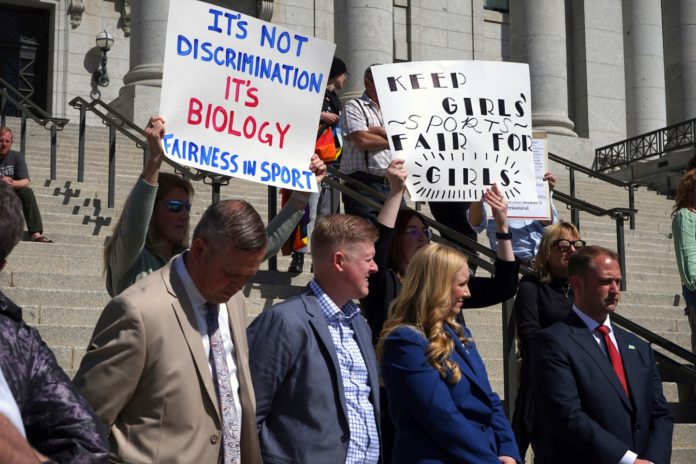
The law, which includes a section outlining the ban, took effect in July after Utah’s Republican-led legislature overrode a veto by Republican Gov. Spencer Cox. Anticipating a potential injunction against the law, Republican lawmakers prescribed the creation of a commission that will determine whether a transgender girl has an unfair advantage — considering the child’s height and weight, for instance, as it weighs those decisions.
In granting the preliminary injunction Friday, Judge Keith Kelly of the Third Judicial District Court in Salt Lake City said the attorneys representing the families of the three transgender girls showed the law has already caused harm by “singling them out for unfavorable treatment as transgender girls.” He added that the injunction allows transgender girls to compete in girls’ sports “only when it is fair.”
The injunction comes two days after the state legislature’s Education Interim Committee inquired about how the Utah High School Activities Association, the organization that oversees state high school activities, handles complaints about transgender students’ participation in sports.
David Spatafore, the association’s legislative representative, said it has received a handful of complaints, including some in which parents argued that a “female athlete doesn’t look feminine enough.”
Per one complaint, a competitor “outclassed” the rest of the field in a girls’ state-level competition last year. Afterward, the parents of the competitors who placed second and third complained to the association, questioning the winning student’s gender.
Spatafore said the association asked the winning student’s school to investigate, and after examining the student’s enrollment records dating back to kindergarten, it found that “she’d always been a female.” Spatafore said he did not reveal the sport, classification or school the student attended to protect her identity. The association did not inform the family of the accused student.
In a recent phone interview with The Washington Post, Spatafore said matters related to transgender student eligibility have been “one of the more critical, one of the more controversial and one of the more time-consuming issues that we’ve been involved in,” particularly over the past three years. He said the association started receiving “a handful” of complaints last year, the timing of which he suspects was tied to the attention surrounding Lia Thomas, a transgender woman who competed for the University of Pennsylvania swimming team.
“We’ve been governing high school sports for 75 years. We’re not new at that. But this is a new issue,” Spatafore said. “It’s become such a hot-button issue that we are preparing ourselves to have a number of complaints.”
Of the 75,000 participants in Utah scholastic sports — a total that counts multisport athletes once for each sport they play — just four are transgender, Spatafore said.
The Utah law is part of a spike in policy proposals and codified laws that restrict transgender girls from participating in K-12 athletics. Nationwide, 17 other states have passed similar laws, although some are also being challenged in court.
While some proponents of an outright ban argued that the Utah law does not go far enough, opponents said the complaints that Spatafore and the UHSAA must consider are an anticipated effect of such laws.
“It’s not surprising to me,” said Susan Cahn, a professor of history at the University at Buffalo whose research focuses on transgender athletes and gender-testing of female athletes. “What I think it does is make the point that not everyone can see, which is that these laws are dangerous to cisgender girls and women as well. [The bills] are often proposed as a way of protecting girls’ sports and women in sports, but I think it gives new legs to an old accusation, an old suspicion, which is the belief that someone really good at sports is possibly a male. And so it undercuts actual girls who are now going to possibly get investigated whether they’re trans or not.”
Suspicion over the sex of certain athletes goes back decades.
In the 1940s, female athletes were required to bring medical “femininity certificates” to substantiate their sex ahead of international competitions. In 1966, the International Association of Athletics Federation, the governing body for international track and field, required female athletes to submit to a gender test that came to be known as the “nude parade,” during which their bodies — particularly their genitals — were inspected. Complaints over that practice led to chromosome tests and, later, DNA tests. The IAAF stopped mandatory gender testing in 1991 and the International Olympic Committee discontinued the practice in 1999.
That history and the current reality are why Cahn sees laws such as the one blocked in Utah as part of a broader push to restrict women’s rights.
“It’s a step along a path that conservatives have been developing for a long time now,” Cahn said. “It just seems like they’ve figured out that anti-trans stuff sticks more than anti-gay legislation. I think anti-trans stuff is more potent politically, and it’s part of a bigger project of restoring what I see as a male-dominant society where men are in charge.
“I think [these laws] do a disservice to women’s sports. And they’re not only about sports — I think it’s about undermining the validity of trans existence.”







